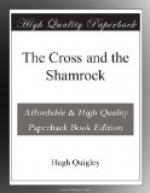The effect of such an artful piece of diplomacy may be easily conceived. The bait of the parson took, and Paul was for once overreached. The unsuspecting youth took this gentleman to be a clergyman of the same stamp with his friends Rev. Messrs. Strongly and H——. And the fact that Parson Dilman was acquainted with the former honorable men, was enough to throw Paul off his guard. The parson’s talk, too, about “Catholic education,” and the “barbarous” common schools, served still to deceive, not only Paul, but even the professors of the college to whom the epistle of Parson Dilman was submitted for advice and direction.
Paul was enthusiastic in the praise of his two reverend convert friends in Vermont, (who were the only two Protestant parsons he intimately knew before or after conversion,) and hence, when questioned by the professors about what he might know of his correspondent, he answered that he knew nothing; but the fact of his intimacy and acquaintance with the ex-parsons Strongly and H——, his friends and patrons, was “a good sign of his honesty and honor.” The shrewd Jesuit professors smiling at the poor child’s credulous and confiding disposition, told him that, as he had such an opinion of the worth and honor of the fraternity of dominies, he might commit his brother to the charge of one, and especially as he stood in very great danger to his faith and morals where he was at present. His situation might be ameliorated, but could not be much worse; but the good fathers declined taking the responsibility of giving a decision on the subject.
“The letter promised what was fair and honorable, but there might be deception,” said they.
“Deception, reverend fathers!” said Paul. “I can’t suspect any such thing in one so intimate with my dearest and best friends, the converted clergymen in Vermont.”
“Well,” said the sons of Ignatius, whose wise experience had taught them to have little faith in heretical parsons, “you can use your own discretion, my child.”
Paul, acting on the impulse of his own feelings, thinking it would be a rash judgment in him to suspect evil design in one who professed himself favorable to Catholicity, and, besides, was of the same sentiments in religion, or nearly the same, with his convert friends in Vermont, immediately wrote in answer to Dr. Dilman, consenting to have Eugene go with him. But there was to be no legal binding in the matter, and honor was to be the only bond under which his younger brother was to be held bound.
The day now arrived for Eugene to part—alas! that it should be forever—from the society of his brother and sister. At first, some opposition was made by Patrick and Bridget; but when shown the letter of their brother Paul, they were reconciled to what they thought the temporary separation. Eugene himself was calmed, and his sorrow turned into joy, by being told that he was going towards where Paul was, and that, like enough, he would meet him on his way.




